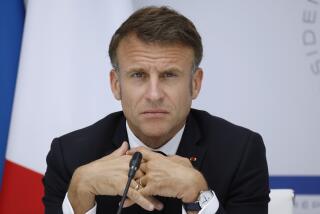France unveils tax-heavy budget
PARIS — To mixed reaction, France’s Socialist government unveiled a get-tough budget Friday that contains $25.8 billion in tax increases and a “supertax” rate of 75% on those earning more than $1.29 million a year.
Critics said it would make France unattractive to “top talent” entrepreneurs and business leaders; supporters described it as fair and constructive.
The hardest hit will be major businesses and the rich, as President Francois Hollande stuck to his May election pledge to introduce the new “supertax” rate on the nation’s wealthiest citizens, applying to about 2,000 to 3,000 people.
France’s public services, meanwhile, escaped major cuts that other Eurozone countries have made in the battle to rein in sovereign debt.
In Spain, meanwhile, a report issued Friday said that its ailing banks need $76 billion to return to health after being hammered by the country’s spectacular real estate collapse, independent auditors and the Bank of Spain said Friday. The long-awaited estimate showed that half of the 14 banks under review are failing so-called stress tests. The grim result confirmed concern about the weakness of Spain’s financial sector, but did not prompt Madrid to immediately request outside help, despite a line of credit on offer from its European partners.
In July, European leaders signed an agreement to lend Spain up to $129 billion to recapitalize its banks. Madrid said it would wait to see the outcome of independent audits of the banks before determining how much of the bailout fund it would tap.
The French government needs about $38.7 billion in new taxes and savings to bring France’s public deficit down to 3% of gross domestic product by next year, in line with European Union rules. The deficit is currently about 4.5% .
Two-thirds of France’s deficit-cutting is to come from new taxes and one-third in spending cuts. The government promised that after 2014 the split between taxes and spending cuts would be switched to 50-50.
Of more than $12.9 billion in new taxes on companies, most will be raised on large corporations by removing tax breaks and exemptions. A further levy of more than $12.9 billion of new taxes on households will affect only top earners, said French Prime Minister Jean-Marc Ayrault, who insisted 90% of taxpayers would be spared tax hikes.
The “supertax” rate of 75 %, a controversial populist measure, will apply for at least two years. A new 45% tax rate will be imposed on those earning more than $194,000.
Hollande described the budget as France’s harshest in three decades, and Pierre Moscovici, the finance minister, said it was an “unprecedented” financial program necessary to comply with the European Union’s 3% rule.
Business leaders, including L’Oreal chief Jean-Paul Agon, have criticized the supertax, saying it would prevent France from attracting top executives and result in the wealthy leaving the country.
On Friday, France’s opposition Union for a Popular Movement party criticized the budget.
Former agriculture minister Bruno Le Maire said he was worried and disappointed. “France is going to the wall,” he said.
He told Europe 1 radio: “None of the solutions announced will get the country back on its feet, fight unemployment or create jobs.”
Former budget minister Valerie Pecresse said that “100% of French people will face tax increases” and that the budget contained “no growth strategy.”
Just four months into his five-year term in office, Hollande is under fire.
As well as grumbling from business leaders, he faces unemployment numbers that topped a symbolic level of 3 million in August and tumbling popularity numbers in opinion polls. He is also facing revolt from traditional allies in union and left-wing groups threatening strikes if the budget is too austere.
A demonstration is planned for Sunday against the EU’s fiscal treaty, which imposes strict deficit limits.
In Spain, officials again declined to specify how much aid they would request.
“With all the nuances, it’s difficult to estimate in the end how much help will be necessary,” Fernando Jimenez Latorre, secretary of state for the economy, told reporters.
Latorre said the amount could be a third less than that contained in the audit, or about $51 billion. He also left open the possibility that Spanish banks might choose to raise the necessary funds on their own rather than tap public money. The first batch of loans is scheduled to be sent to Spanish banks in November after approval by Spanish and European officials.
Nearly half of the overall sum — about $32 billion — was needed by a single financial institution: Bankia, Spain’s largest real-estate lender, whose bankruptcy last spring threatened to drag down the country’s entire financial system, according to the audit. Bankia, Spain’s fourth-largest bank, is a conglomerate of seven regional lenders that together have dangerously high exposure to bad real-estate loans.
Jean-Claude Juncker, head of the finance ministers’ group in the 17-nation Eurozone, said he was “comforted” by the audit results.
“The final state aid provided to Spanish banks will be lower than the reported capital shortfall, given measures to be taken by the banks in accordance [with] their recapitalization and restructuring plans,” Juncker said in a statement.
For months, 400 auditors reviewed transactions in 90% of Spain’s banking sector, said Fernando Restoy, deputy governor of the Bank of Spain. Seven of the 14 banks under review failed stress tests.
The audit results were published a day after Spain slashed about $50 billion from its budget for next year. By recapitalizing its banks with European help, and cutting spending at home, Spain hopes to avoid having to ask for a second, larger bailout for the government as a whole.
Special correspondents Willsher reported from Paris and Frayer from Madrid.
More to Read
Sign up for Essential California
The most important California stories and recommendations in your inbox every morning.
You may occasionally receive promotional content from the Los Angeles Times.










